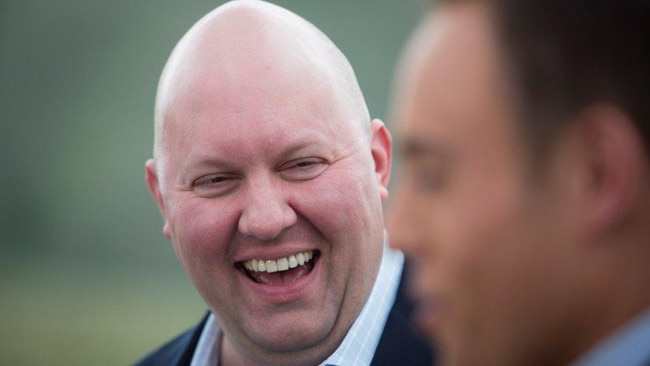When it comes to the end of the private equity boom, R.E.M’s Michael Stipe sum it up best
The private equity boom lured investors at every level – big names pushed the action but in the end if you ignore investing principles you get burnt.

In 1992, when Michael Stipe from R.E.M. wrote the words to the bittersweet hit song Nightswimming, it’s most unlikely he had some of the stupid elements of the recent private equity boom in mind.
Nevertheless, the lyrics provide an eerily fitting description of the causes for the mess now unfolding, a mess that should also serve as a lesson as to why some simple investing principles must never be ignored.
“I’m not sure all these people understand
It’s not like years ago
The fear of getting caught
Of recklessness and water
They cannot see me naked
These things, they go away
Replaced by everyday”

In September 2019, predicting the eventual end of the boom in private equity-funded “disrupters”, I wrote: “As the old aphorism warns, Wall Street will sell what Wall Street can sell.
“If frustrated high net worth investors want to escape low interest rates by speculating on start-ups with no prospect of making a profit, except from selling that start-up to a bigger fool, then that is the service private equity funds will provide.
“A new record number of private equity firms around the world are now holding a record US$1.9 trillion of uncalled capital to invest in a record number of deals at record high multiples so that they can IPO (float) a record number of unprofitable unicorns. It’s plainly absurd.”
More than 1200 start-ups claimed valuations of more than a $1bn despite many, if not most, losing money every month.
As REM would have it: “These things go away, replaced by everyday.”
Amid the gold rush, when the tide of cash was rushing in, start-up founders argued that their disruptive business models would creatively destroy incumbents, making them even more valuable than the giants they replaced; But many were swimming naked.
Today, thanks to cash looking more attractive as an investment proposition than it did in 2019, funding for “profitless prosperity” companies has predictably dried up. And what is now emerging is the discovery of a level of deception as unprecedented as the boom in private equity and venture capital funding itself.
To justify ever increasing capital requirements at ever increasing valuations, unethical behaviour emerged.
It’s now evident fraud, falsification of customer data and the absence of even a viable business idea, were no barrier to securing funding from a conga line of investors desperate to escape punitively low interest rates.
Start-ups on a slippery slope
A string of mostly US-based start-up companies are now reported to be somewhere along the path most infamously trailblazed by Theranos founder Elizabeth Holmes – from investigation and indictment to potential conviction. Holmes has been sentenced to 11 years in prison for defrauding investors.
You probably know the Holmes and Theranos story from a string of books and documentaries – most notably Bad Blood by Wall Street Journal author John Carreyrou. Or indeed the movie The Dropout with Amanda Seyfried.
As The Australian reported last year: “Elizabeth Holmes, the disgraced Theranos founder who was once compared to Steve Jobs before she was convicted of defrauding investors who backed the now-defunct blood-testing company, has been sentenced to more than 11 years in prison.

“The pregnant Holmes, wearing a black skirt and blouse, was given 135 months behind bars by US District Judge Edward Davila in the same California courtroom where a jury convicted her in January.”
You may not know Rishi Shah, the founder of Outcome Health who was found guilty of defrauding investors and customers.
But last week the WSJ reported: “A federal jury convicted three former executives of the once high-flying start-up, Outcome Health, on several charges that they ran a billion-dollar scheme that defrauded customers, including major pharmaceutical companies such as Novo Nordisk A/S as well as investors including Goldman Sachs Group Inc.
“Investors sued the company after the Journal revealed the fraud, and the case was settled when Mr Shah and Ms Shadra Agarwal agreed to leave their executive roles and give back $159m of the money they received from the investment.
“The company had also raised nearly $500m in loans, $38m of which went to Mr Shah and Ms Agarwal, according to a pre-trial filing from prosecutors.

“The government had alleged that Messrs. Shah and (Brad) Purdy and Ms Agarwal participated in a joint criminal venture to charge pharmaceutical company clients for running ads on more screens than Outcome had installed in medical offices, and to conceal from clients, auditors, lenders and investors the extent to which they didn’t deliver the promised ad space.”
And yet, this has all occurred despite private equity practitioners being aware that such outcomes were likely.
In 2014 one of the private equity industry’s stalwarts, Marc Andreessen, tweeted “high-cash-burn start-ups almost never survive down rounds. VAPORIZE. Further, to get into this position, you probably had to raise too much (money) at a too high valuation before.”
During the boom it seems nobody cared because prices were going up.
I recall sitting down to lunch with investors, being called a Cassandra, and having my explanation, that these “businesses” – if you could call them that – weren’t profitable and weren’t ever likely to be, being met with, “who cares, their (price is) doubling every quarter.
Rising prices don’t define a business
The first rule investors must never forget is to not take your cue from prices. Rising prices don’t define the underlying business. The business ultimately defines the price.
If the business is destined to remain unprofitable, an investment in that business will be unprofitable as well.
Of course, hope springs eternal, and even now you might harbour the misplaced assumption that the next time some trend or theme rockets, you will be able to jump aboard and alight before it all turns to rats and mice.
But you won’t.
An equally important lesson stems from the widely reported mistake that many experts in private equity and venture capital have recently been found guilty of.
Let’s call it due diligence by referral. By this I mean, not conducting sufficient, or any, research and analysis simply because someone else you respect has also made an investment.
Simply relying on the imprimatur or endorsement of wealthier, or more experienced co-investors is no guarantee of success. Indeed I believe one deserves to fail if no due diligence is conducted.
And that brings me to the third lesson – diversification.
Fraud, by definition, cannot be regulated against. Fraud is a breach of law and trust. No words on paper can inhibit it.
It will occur again, because, as Michael Stipe once penned, people will never understand that swimming naked and recklessness will always exist if there’s no fear of getting caught.
Everyone should expect to make a few investments in life, that will turn sour because of someone else’s greed, a desire for power or their flagrant disregard for the law.
By accepting that inevitability, you may be motivated to make several smaller bets as opposed to putting it all on accepting that inevitably one is motivated to make several smaller bets as opposed to putting it “all on black”.
Finally, during the next boom or bubble, remember Stipe’s lyric: “These things, they go away, replaced by everyday.”
Roger Montgomer is founder and chief investment officer at Montgomery Investment Management




To join the conversation, please log in. Don't have an account? Register
Join the conversation, you are commenting as Logout